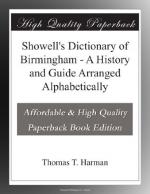let their companions fall over the graves.—On
St. John’s Days, when the ancient feast or “wake”
of Deritend Chapel was kept, it, was the custom to
carry bulrushes to the church, and old inhabitants
decorated their fireplaces with them.—In
the prosperous days of the Holte family, when Aston
Hall was the abode of fine old English gentlemen,
instead of being the lumber-room of those Birmingham
rogues the baronets abominated, Christmas Eve was
celebrated with all the hospitalities usual in baronial
halls, but the opening of the evening’s performances
was of so whimsical a character that it attracted
attention even a hundred years ago, when queer and
quaint customs were anything but strange. An old
chronicler thus describes it:—“On
this day, as soon as supper is over, a table is set
in the hall; on it is set a brown loaf, with twenty
silver threepences stuck on the top of it, a tankard
of ale, with pipes and tobacco; and the two oldest
servants have chairs behind it, to sit in as judges,
if they please. The steward brings the servants,
both men and women, by one at a time, covered with
a winnow-sheet, and lays their right hand on the loaf,
exposing no other part of the body. The oldest
of the two judges guesses at the person, by naming
a name; then the younger judge, and, lastly, the oldest
again. If they hit upon the right name, the steward
leads the person back again; but if they do not he
takes off the winnow-sheet, and the person receives
a threepence, makes low obeisance to the judges, but
speaks not a word. When the second servant was
brought the younger judge guessed first and third;
and this they did alternately till all the money was
given away. Whatever servant had not slept in
the house the previous night forfeited his right to
the money. No account is given of the origin
of this strange custom, but it has been practised
ever since the family lived there. When the money
is gone the servants have full liberty to drink, dance,
sing, and go to bed when they please.”
Railways: London and North Western.—The
first proposal for converting Birmingham with the
outer world by means of a railway seems to have originated
in 1824, as we read of the share-book for a Birmingham
and London line being opened here on December 14 of
that year. There was a great rush for shares,
2,500 being taken up in two hours, and a L7 premium
offered for more, but as the scheme was soon abandoned
it is probable the scrip was quickly at a discount.
Early in 1830 two separate companies were formed for
a line to the Metropolis, but they amalgamated on
September 11, and surveys were taken in the following
year. Broad Street being chosen as the site for
a station. The Bill was introduced into the House
of Commons February 20, 1832, but the Lords rejected
it in June. Another Bill, with variations in the
plans, was brought in in the session of 1833, and
it passed on May 6, the work being commenced at the
London end in July, and at Birmingham in June of the




